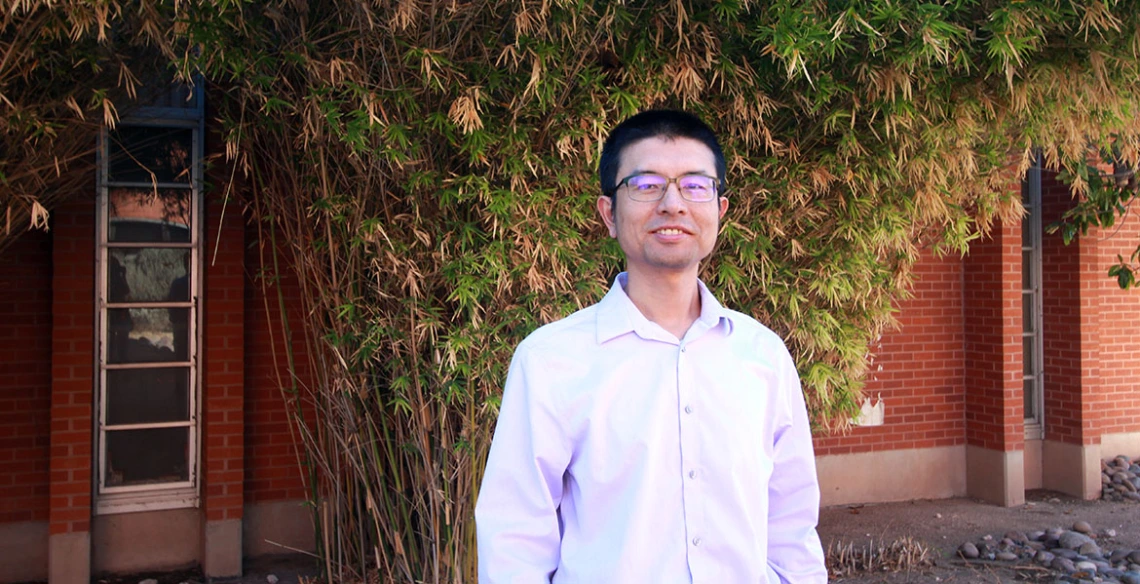IEEE Selects ECE Associate Professor for Elite Fellowship
World’s largest technical professional society recognizes the University of Arizona’s Ming Li for his lasting contributions to information and network security.

Associate professor Ming Li develops protocols and systems for securing sensitive data, including medical information and data shared between automated vehicles.
In a world increasingly dependent on integrated wireless devices and cloud-based systems, Ming Li, University of Arizona Distinguished Scholar and associate professor of electrical and computer engineering, is pioneering better ways to keep sensitive information safe.
Recognizing his extraordinary contributions to controlling data breaches, the Institute of Electrical and Electronics Engineers – the world’s largest technical professional organization – elected Li to its 2024 Class of Fellows, a distinction held only by a minuscule portion of IEEE members.
“It’s a big honor, and I’m really delighted. I also have to thank my peers, students and collaborators. My work would not have been possible without them,” said Li, whose appointment makes him the ninth IEEE fellow in the Department of Electrical and Computer Engineering.
Li is dedicated to improving security in the integrated systems becoming increasingly commonplace in vehicles, appliances and health monitors, for example.
“Ming Li stands at the forefront of nationally significant research in security and privacy for next-generation wireless and cyberphysical systems,” said Michael Wu, department head and professor of electrical and computer engineering. “His technological achievements are nothing short of remarkable.”
Keeping Medical Information Secure
Early in his research repertoire, Li developed a way to better secure outsourced storage of medical records in the cloud.
“When you store records in the cloud, you lose control of the data,” he said. “You need a framework to empower users to protect their data, even though it’s stored remotely.”
End-to-end encryption, which codes data and requires the recipient to have a digital key for decryption, has been a go-to solution. But this tool is not without its share of logistical challenges, particularly in an environment where multitudes of users, all of whom must possess a digital key, have different levels of authorization for various purposes.
“Suppose there are tens of thousands of users – like customers, doctors and insurance administrators – who need access to the data. Managing that becomes a mess. It’s not scalable,” Li explained.
Li’s attribute-based control system adds an extra layer of encryption to sort and group users depending on their roles. For example, a doctor can see only medical data and a bookkeeper just financial information.
Connecting Devices on People and in Cars
For one research area, Li developed a way for wearable devices such as medical monitors and health trackers to recognize one another without the risk of information falling into unwanted hands.
“You want to be sure all the devices belong to you, and you don’t want your data leaked to some bad guys eavesdropping,” he said. “That means you have to authenticate the devices.”
Sensors in these types of devices typically use very low power, and their interfaces don’t offer many ways to interact. They may not even support use of a password. Accordingly, Li created an authentication method that recognizes unique characteristics of the environment.
For instance, two sensors seeking to connect could compare the profiles of the local radio frequency network or wireless channel to authenticate.
“If you put a couple of devices on your body, those profiles are unique. No one else should be able to spoof them,” he said. “The process is proximity-based, and it just ensures the devices are in the same context.”
This process uses such precise location data that even a distance of a few feet would prevent the security tool from making unauthorized connections, Li said.
Most recently, Li has extended his research to developing safe data sharing and efficient communication technologies for automated vehicles taking to the road together. Long-haul trucking companies, for instance, are interested in the possibilities of platooning vehicles on highways.
Technology with Global Reach
Fewer than 0.1% of the organization’s voting members are selected each year for the prestigious IEEE fellowship. Li also received the NSF Early Faculty Development (CAREER) Award in 2014 and the ONR Young Investigator Program (YIP) Award in 2016. Prior to joining the UA, he was an assistant professor in the Department of Computer Science at Utah State University from 2011 to 2015. He received an MS in electronic and information engineering from Beihang University in 2008 and a PhD in electrical and computer engineering from Worcester Polytechnic Institute in Massachusetts in 2011.
His seminal work addressing critical issues around security and privacy will undoubtedly have a lasting effect on society, said Wu, adding, “He is a rising star who has my heartfelt congratulations for this well-deserved recognition.”

